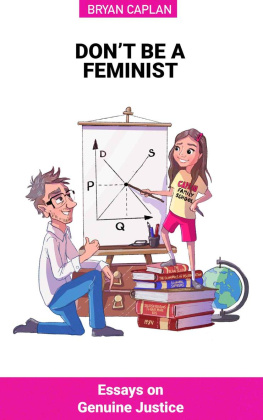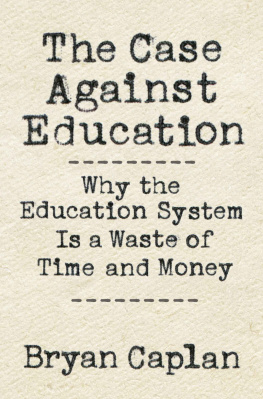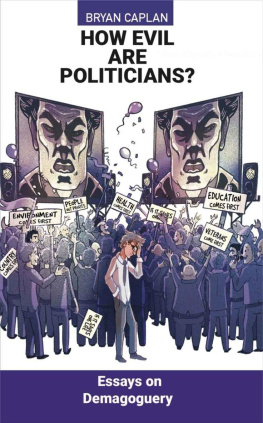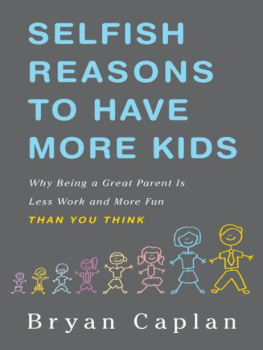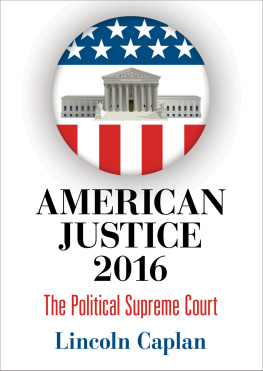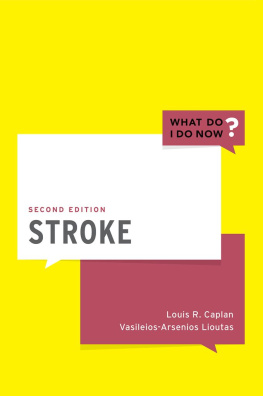Bryan Caplan - Dont Be a Feminist: Essays on Genuine Justice
Here you can read online Bryan Caplan - Dont Be a Feminist: Essays on Genuine Justice full text of the book (entire story) in english for free. Download pdf and epub, get meaning, cover and reviews about this ebook. year: 2022, publisher: Bet On It Books, Fairfax, Virginia, genre: Politics. Description of the work, (preface) as well as reviews are available. Best literature library LitArk.com created for fans of good reading and offers a wide selection of genres:
Romance novel
Science fiction
Adventure
Detective
Science
History
Home and family
Prose
Art
Politics
Computer
Non-fiction
Religion
Business
Children
Humor
Choose a favorite category and find really read worthwhile books. Enjoy immersion in the world of imagination, feel the emotions of the characters or learn something new for yourself, make an fascinating discovery.
- Book:Dont Be a Feminist: Essays on Genuine Justice
- Author:
- Publisher:Bet On It Books, Fairfax, Virginia
- Genre:
- Year:2022
- Rating:3 / 5
- Favourites:Add to favourites
- Your mark:
- 60
- 1
- 2
- 3
- 4
- 5
Dont Be a Feminist: Essays on Genuine Justice: summary, description and annotation
We offer to read an annotation, description, summary or preface (depends on what the author of the book "Dont Be a Feminist: Essays on Genuine Justice" wrote himself). If you haven't found the necessary information about the book — write in the comments, we will try to find it.
Dont Be a Feminist: Essays on Genuine Justice — read online for free the complete book (whole text) full work
Below is the text of the book, divided by pages. System saving the place of the last page read, allows you to conveniently read the book "Dont Be a Feminist: Essays on Genuine Justice" online for free, without having to search again every time where you left off. Put a bookmark, and you can go to the page where you finished reading at any time.
Font size:
Interval:
Bookmark:
Bryan Caplan
Dont Be a Feminist
Essays on Genuine Justice
First published by Bet On It Books, Fairfax, Virginia 2022
Copyright 2022 by Bryan Caplan
All rights reserved. No part of this publication may be reproduced, stored or transmitted in any form or by any means, electronic, mechanical, photocopying, recording, scanning, or otherwise without written permission from the publisher. It is illegal to copy this book, post it to a website, or distribute it by any other means without permission.
First edition
Editing by Ashruta Acharya
To my wife, Corina, and my daughter, Valeria.
D ear Vali,
Youre growing up, and before long youre going to hear about an idea called feminism. Most of those who talk about this idea will speak as if feminism is obviously true. They will speak as if feminism is entitled to your support. And they will speak as if you have to be evil to oppose feminism. As I write this, youre still too young to read it. But I want to get my thoughts down on paper now so theyre waiting for you when youre ready.
As youve probably heard, Vali, I am one of feminisms opponents. And since I am your father, you know Im not evil. Indeed, in at least one way, Im saintly: I never lie to you. Other adults often try to deceive you, allegedly for your own good. Your father, however, believes in telling you the truth even when the truth is ugly or unpopular. You know all this from first-hand experience. However you react to my critique of feminism, what follows is the literal truth according to me.
1. Defining Feminism
To start, what is feminism? Many casually define it as the view that men and women should be treated equally or even the radical notion that women are people.1 However, virtually all non-feminists in the United States believe exactly the same thing. In this careful 2016 survey, for example, only 33% of men said they were feminists, yet 94% of men agreed that men and women should be social, political, and economic equals.2
So what? Well, the whole point of a definition is to distinguish one concept from all the others. Any sensible definition of feminism must therefore specify what feminists believe that non-feminists disbelieve. Defining feminism as the view that men and women should be treated equally makes about as much sense as defining feminism as the view that the sky is blue. Sure, feminists believe in the blueness of the sky but who doesnt?
What then is a reasonable definition a definition that identifies the central point of contention between feminists and non-feminists? Something like this: Feminism is the view that society generally treats men more fairly than women.3
What makes my definition so superior to the competitions? Just talk to self-identified feminists and non-feminists, and youll see that my definition fits the common usage of the word. Ask any feminist if society generally treats men more fairly than women and theyll confidently agree. If you push further and ask, Doesnt society sometimes treat men unfairly, too? theyll respond along the lines of, Sure, but the point is that women endure far more unfairness than men. In contrast, if you ask non-feminists if society generally treats men more fairly than women, they wont rush to sign on the dotted line. Instead, theyll say Maybe in some ways, express agnosticism, flatly disagree or just shrug.
Upshot: You should be a feminist if and only if society generally treats men more fairly than women. So does it? This is a complex, confusing question, but we can credibly answer it. How? The best way to tackle complex, confusing questions, as Ive taught you, is to break them into simpler, clearer steps. Here are the steps I propose.
Step 1: List the main ways that society appears to treat women less fairly than men and the main ways that society appears to treat men less fairly than women.
Step 2: Weigh the extent to which these fairness gaps are genuine, by correcting for gender gaps in actual performance.
Step 3: Aggregate all the performance-corrected gaps from Step 2.
So lets follow the steps.
2. Listing Unfairness
Listing the main ways that society appears to treat women less fairly than men is easy because feminists have been broadcasting their concerns for generations. Topping the list:
a. Men make more money than women.
b. Men are overrepresented at the top levels of business, government, science, and beyond.
c. Men do much less childcare and housework than women.
d. Non-custodial fathers provide little financial or parental support for their children.
e. Men are the perpetrators, and women are the victims, of the vast majority of sexual violence.
f. Men view women as sex objects.
Listing the main ways that society appears to treat men less fairly than women requires only a little more reflection to complete.4 Topping the list:
a. Men are overrepresented at the bottom levels of society. They do most of the nasty, dangerous work, are much more likely to be homeless or imprisoned, and much more likely to kill themselves.
b. Men spend much more time on the job than women.
c. The law heavily favors women in child custody and child support disputes.
d. Men are more likely to be victims of violent crime.
e. Men are much more likely to die in combat; in fact, during serious military conflicts, they face military slavery (the draft).
f. Women view men as success objects.
Critics of feminism typically respond to the first list with the second list. Since the key contention is whether, Society generally treats men more fairly than women, and the two lists are in the same ballpark of unfairness, this is not a bad approach. However, merely countering the first list with the second takes a questionable shortcut.5
3. Evaluating Unfairness
The questionable shortcut is: Assuming that if outcomes are unequal, society is unfair. Quite crowd-pleasing. Yet on reflection, there is a world of difference between unfairness and inequality. I have never won an Olympic medal, but I was not treated less fairly than repeat Olympic champions. I have zero medals due to my own lack of athletic talent and effort, not because the tournaments rules are somehow stacked against me. The upshot: To assess feminism, we cannot merely list gender inequalities; we have to figure out why these inequalities exist.
If this sounds hard, it is. Fortunately, I belong to an intellectual discipline that knows how to handle questions like these. My discipline, as you recall, is economics. Our standard approach to gender disparities is to use statistics to compare the results for men and women with identical non-gender traits.6 This allows us to see, for example, if women make less money because they are women, or because they are less likely to work full-time jobs. When we apply this method to the modern United States, most of the apparent unfairness for both women and men turns out to be grossly overblown.
a. The Earnings Gap
Lets start with the gender earnings gap. Economists have studied it for decades, and Ive spent years going over the data myself.7 Theres a strong result: If you compare single, childless men to single, childless women, almost all of the earnings gap goes away.8 The overwhelming reason women earn less is that the average man focuses heavily on making money, while the average woman tries to balance making money, caring for her kids, and self-expression.
Honestly, though, the statistics are overkill. If it were really true that women were paid, say, 20% less than equally productive men, every business would have a no-brainer get-rich-quick strategy: Fire all your men and replace them with women, cutting labor costs by up to 20%. If this strategy really worked, it would have swept the economy ages ago. Why complain about unfairness when you can become a billionaire by counteracting it?
Next pageFont size:
Interval:
Bookmark:
Similar books «Dont Be a Feminist: Essays on Genuine Justice»
Look at similar books to Dont Be a Feminist: Essays on Genuine Justice. We have selected literature similar in name and meaning in the hope of providing readers with more options to find new, interesting, not yet read works.
Discussion, reviews of the book Dont Be a Feminist: Essays on Genuine Justice and just readers' own opinions. Leave your comments, write what you think about the work, its meaning or the main characters. Specify what exactly you liked and what you didn't like, and why you think so.

